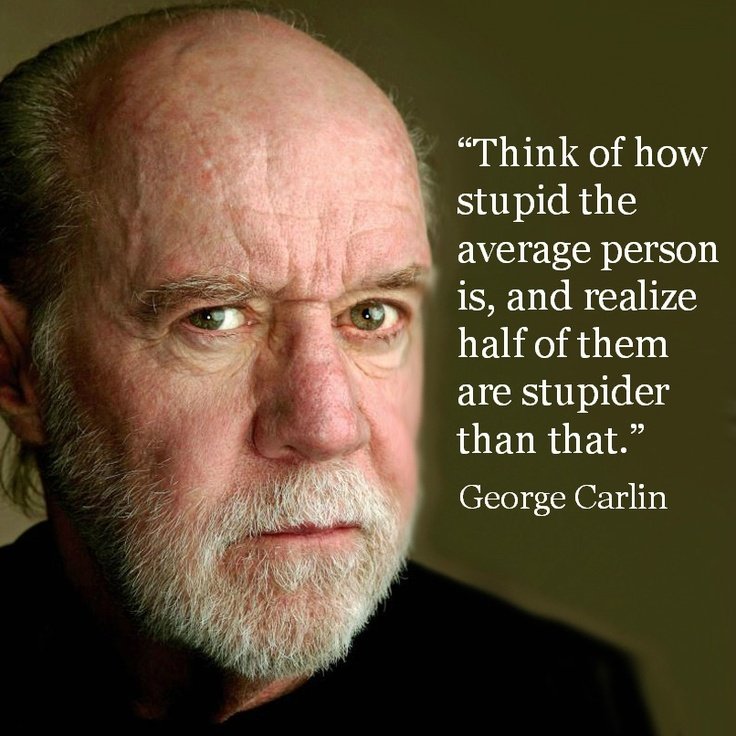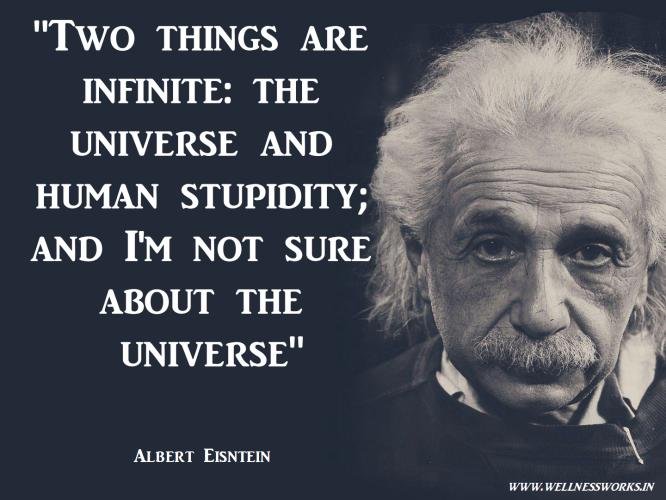The Meditations of Marcus Aurelius
I have always had difficulty controlling my anger when it comes to dealing with "the common man." You may ask, what do you mean by "the common man?" Well...

(Source: https://imgflip.com/gif/3t4wwr)
Or...

(Source: https://www.reddit.com/r/QuotesPorn/comments/10gkdtk/think_of_how_stupid_the_average_person_is_and/)
And of course...

(Source: https://wellnessworks.in/albert-einstein-quotes-about-life-wellnessworks/)
They say that intelligence and loneliness often go hand in hand. Probably because the intelligence allows them to see the world, and people, from a more realistic perspective. One of the most intelligent and profound thinkers, whose book has continued to withstand the test of time to this day, is Marcus Aurelius. He was able to see, not only people for who they were, but the human soul as well. And despite being written nearly 2,000 years ago, it contains many truths and lessons that are still entirely relevant to this day.
An interesting fact: Marcus Aurelius never intended to have any of his writings published. These were only ever recorded in his private diary.

(Image created using an AI art generator on Night Cafe)
Aurelius was the Roman Emperor from 161 to 180. His reign was so influential that he is considered the last of the Five Good Emperors, rulers who gained the admiration of their people through a peaceful and stable governance. You may be thinking, my God, how may that be possible when it can barely be achieved today?! 😱 Well, we are about to get into it!
Meditations is a collection of 12 books, written by Marcus Aurelius in order to practice stoicism, and thus self-improvement. If you are unfamiliar with the term, stoicism is the mentality of focusing on the things that we can control (our thoughts, emotions, actions), while accepting the things that we cannot (death, disease, natural disaster, etc.). As such, you can understand why this book spoke to me 😅 People, especially their words, actions, opinions... are entirely out of my control, yet they continue to possess so much power over my life -- my mind. I needed to change my perspective on things.
The book begins in a rather lovely manner; Aurelius pays homage to the people who influenced his life in some way.
Of course, there is his family: his father (who passed away when Marcus was only 3), his mother, his military advisors, past philosophers before him... There were a few passages from this book that I found enlightening.
"Apollonius taught me to give my mind its due freedom, and separate it from relying upon chance. Not to pay attention, though ever so little, to anything unacceptable by reason. To maintain an equality of temper, even in acute pains, and loss of children, or tedious sickness."
(Apollonius was a Greek philosopher)
This is life's greatest challenge: to keep composure, even in the face of great adversity. The early philosophers heavily believed in two principles. The first is to live "naturally," to live in harmony with nature, with what is natural. To go against nature is inhuman and quickly leads to chaos. The second principle is to stand by truth -- whatever you believe to be truth -- no matter what. So long as you stay focused on your truth and your path, nothing else can affect you.
"I learned of Catulus not to insult a friend for making an objection, though it should happen to be unreasonable, but rather to endeavour to restore him to his natural state of mind."
(Catulus was a political advisor)
Again, another lesson that is easier said than done 😅 Granted I still get into a mindset of, "This is common sense! You're an absolute moron who can't be helped -- oh well! 😤 I actively try to remain as civil as possible when expressing my own opinion, but in today's day and age, it is very difficult to excuse ignorance...
Aurelius goes on to explain how to keep composure when facing adversity.
"I am likewise convinced that no man can do me any real harm, because no man can force me to misbehave myself, nor can I find it in my heart to hate or to be angry with one of my own nature and family."
Wise words indeed. If I am self-assured in who I am as a person and what my morals are, then how can anyone truly cause me harm? It is important to remember that no matter how terribly someone may go against me, we are still kin in one way or another -- one human race.
"Continue to dishonour yourself, my soul! Neither will you have much time left to do yourself honour. For the life of each man is almost up already; and yet, instead of examining yourself, you place your happiness in the souls of other men."
Instead of looking inwards, evaluating yourself, and working on self-improvement, you would rather seek validation and happiness from others. I feel like this describes the current state of the world perfectly.
"Manage all your actions, words, and thoughts accordingly, since you may, at any moment, quit life."
A simpler message, and one that I'm sure you have heard for yourself many times: live every day as if it were your last. Therefore mind yourself at all times, and always try to act righteously. Even if we should end up discovering that there is no Heaven and Hell, there is nothing wrong with living a virtuous life regardless; who will you have hurt by doing so?
The third book delves more into the people that you should pay no mind to.
"For the future, do not spend your thoughts upon other people, unless you are led to it by common interest. For the prying into foreign business—that is, musing upon the talk, fancies, and schemes of another, and guessing at the what and why of his actions—does but make a man forget himself, and ramble from his own guiding principle."
This has been, without a doubt, the most important lesson I have taken from Meditations. The amount of times I not only get distracted by stupid and ignorant people, but also by their stupid intentions. I can spend hours trying to rack my brain for an answer as to why this person did this, when in reality I can just accept I have no control over other people. But more importantly, who cares why they did it? 🤷♀️😄
"As for others, he knows their way of living, both at home and abroad, by day and by night, and their companions in their evil way of life, and he bears it in mind. Why, indeed, should he value the praise of such people, who are not able even to please themselves?"
Again, another personal favourite of mine. If I know how certain people choose to live -- miserably and sinfully, never taking accountability or responsibility, or bothering to do any personal growth -- then why would I care whether they adore or resent me? Those kinds of opinions are meaningless.
Book IV begins to cover the methods in which a person can humble themself.
"Do not suppose you are hurt, and your complaint ceases. Cease your complaint, and you are not hurt."
Love love love this one. I'll be the first to admit, sometimes I am a miserable bitch who enjoys "giving into" the negative. This is such a simple yet profound approach to that mindset. If I believe that I am never hurt in the first place, then there is nothing to complain about -- simple!~
"If a man insults you, do not accept his opinion or think just as he would have you do. No, look upon things as reality presents them."
Again, simple yet profound. Unless it is rooted in truth, no one's opinion matters to me. Not what they think about the world, others' lifestyles, or me! It is why even if someone and I do agree on something, that's great and I accept it. I do not try to praise them for common sense, and I certainly don't try to befriend them 😂 Agreeing on one matter does not mean agreeing on all matters.
"He that is so very solicitous about being talked of when he is dead, and makes his memory his inclination, does not consider that all who knew him will quickly be gone." " If you depend so desperately upon the good word of other people, you will be unworthy of your nature."
Sound familiar? How many people from today's society are purely focused on "clout" and social media success, especially today's younger generations? Again, you should never seek validation from other people; look within yourself first!
"Therefore before a man sets forward, he should ask himself this question: 'Am I not upon the verge of something unnecessary?' Furthermore, we should apply this hint to what we think, as well as to what we do. For rash thought draws unnecessary action after it."
Why it is so important to remain calm and collected, even during stressful situations, or when encountering wicked people. Stay focused on yourself and your path, regardless of what obstacles may come your way.
Book V covers more of the stoic principles, particularly the theme of nature and living in harmony with the universe.

"My being consists of matter and form; that is, of soul and body. Annihilation will never reach either of them, for they were not produced out of nothing. The consequence is, that every part of me will serve to make something in the world; and this again will change into another part through an infinite succession of change."
It's easy to lose sight of the bigger picture, but this really is what life, and the laws of the universe, are all about. It's why "we're born alone, and we die alone," is bullshit. We were made of this earth, and soon we shall return to it as well. Such is the order of things.
"When we consider we are bound to be of service to mankind, and bear with their faults, we shall perceive there is a common tie of nature and relation between us. But when we see people grow troublesome and disturb us in our business, here we are to look upon men as indifferent sort of things, no less than sun or wind, or a wild beast."
This is the stage that I am currently at 😅 I'm extremely indifferent to other people, especially those who disturb my peace of mind. I have tolerated enough morons and abuse throughout my life that I no longer have patience for it. It's very difficult for me to break this perspective...
"Reflect frequently upon the instability of things, and how very fast the scenes of nature are shifted." "Now, is not that man a blockhead that lets these momentary things make him proud, uneasy, or sorrowful, as though they could trouble him for long?"
Again, everything is momentary; nothing lasts forever. This is a great perspective when it comes to the tragedies of life, but also for the bounties that we receive, so as not to become boastful. Obviously we can still experience sorrow and happiness, that's totally fine! But we should always remember that everything -- positive and negative, good or bad -- is temporary. Including our time here!!
"What good will this anger do you? But you will say, the man has reason, and can, if he makes a great effort, discover wherein he offends. I wish him joy of his discovery. Well, if you think mankind so full of reason, pray make use of your own. Argue the case with the unreasonable person, and show him his error. If your advice succeeds, he is what you would have him be; and then there is no need of being angry."
Why it is so important to try and make others see reason; I would much rather live in harmony with mankind than in contempt of them. And again, if they cannot see reason, or refuse to see it, then that is their burden to bear. I'll be on my way 👋
The sixth book goes into detail of what the vices are considered to be.
"What is wickedness ? What you have often seen. When you are in danger of being shocked, consider that the sight is nothing but what you have frequently seen already. Everywhere up and down, ages and histories, towns and families, are full of the same stories. There is nothing new to be met with ; but all things are common, and quickly over."
An interesting perspective... Think about the wickedness we have encountered throughout all of history. Adolf Hitler, Joseph Stalin, Mao Zedong... Genocide, addiction, gluttony... Sometimes wickedness can feel incredibly overwhelming, like we'll never see the light again. Yet, so long as the stoic principles reign supreme, humanity has always managed to pull through.
"A sour gruff look is very unnatural, and to put it on often will make it settle, and destroy the beauty and pleasantness of the aspect, to a form that it is never to be recovered. It is high time for those people to die that have outlived the sense of their own wrongdoing."
Thank you!! Again, if one chooses to squander the gift of life, and does nothing to improve themselves or society, then what is the point? To indulge is just a strain on the rest of us.
"Do not let your mind run upon that which is not your own, but pick out some of the best of your circumstances, and consider how eagerly you would wish for them, were they not in your possession."
I think about this from time to time, whenever I'm unsatisfied. How, not too long ago, I was wishing for this, but now I'm already on the search for something else. I try to learn to be content with what I have, to appreciate everything that I'm able to, and in recent years, I've made huge strides of improvement in this area 👍
More lessons, taken from Book VII...
"Make the best of your time while you have it. Those who are so solicitous about fame never consider that future generations will be much the same as the present whom they are vexed with, and they, too, are mortal. What then can the noise or opinions of such little mortals signify to you?"
It has been the human dilemma since the dawn of time: how will people remember me? What will be my legacy? The truth is, we should not concern ourselves with such matters. As Aurelius stated, how many people from prior generations do you remember? Probably not many, and after you that number will lessen. Therefore worry not what people think of you, even if it is good; people are fickle. Preoccupy your time with a virtuous life.
"No accident can happen to any man but what is consequent to his nature. Now if things do not stray from that which is according to nature and design, why should you complain? You may be assured the universal nature has never laid upon you an unbearable evil."
I have trouble with this one. I understand Aurelius is speaking in terms of "the hand" that we are dealt in life, that we are never given any challenges or misfortunes that we cannot endure. However, I cannot help feeling there is almost the indication of, you get what you deserve. How am I supposed to interpret this when, say, an innocent baby is born with a terminal illness? Is it "the baby's nature" that makes this outcome necessary? The parents?
Then to say that everything has already been written in fate anyway? 🤨 I'm unsure of how to interpret this...
"My will is as much my own as my anatomy; and no more concerned in the will of another man, than my breath and body is in another man's. For though we are born for the service of each other, our liberty is independent. Otherwise my neighbour's fault might be my misfortune. But God has prevented this consequence, lest it should be in another's power to make me unhappy."
No one has the ability to make me feel something that I choose not to feel; nobody can hold this power over me. For someone to evoke strong emotions within me shows that I am not in control of myself -- they are.
Book IX again goes into detail about wicked men and circumstances.
"And he that is guilty of a lie out of ignorance is an irreligious wretch. For by deceiving his neighbour, he is unjust to him. He opposes from the nature of society, brings chaos into the world, and opposes the nature of the universe."
Again, I have no issues trying to correct someone's mischievous behavior or opinion. It is only when someone chooses to live ignorantly -- when one knows better but willingly chooses to do otherwise -- that I want no part with them.
"Now, he that is afraid of pain will be afraid of something that will always be in the world; but this is a failure in reverence and respect."
Another interesting perspective... It is foolish to dread something that is an inevitable part of life, of the world. Like pain, or death. Both things are inevitable, both things are apart of the circle of life. Remember: it is wrong to go against nature.
"He is better bred and more a gentleman, that takes leave of the world without a stain on his character. He has nothing of falsehood and deceit, of luxury or pride, to tarnish his character. But when a man has dipped in these vices, the next best thing is for him to quit life. Have you determined to abide with vice, and has not even experience yet taught you to fly from the plague? For the destruction of reason and the mind is a far worse plague than the corruption of the air that surrounds us; for beast only suffers in the first case, but the man in the other."
It is better to have lived a virtuous life and leave with death peacefully, then to destroy your humanity in the pursuit of vices.
"But if you stand in need of a vulgar remedy to soothe your mind, consider, then, what sort of world and what sort of customs you will be rid of!"
I got a chuckle out of this one 😅 If you are looking for some low hanging fruit as to why you should be happy to die, at least you will finally be free of everyone and everything that irks you! 😂
"One man prays that he may gain such a woman, but rather pray that you may have no such inclination. Another invokes the gods to set him free from some trouble; but let it be your petition that your mind may never put you upon such a wish. A third is very devout to prevent the loss of his son; but I would have you pray rather against the fear of losing him. Let this be the rule for your devotions, and see if the event does not answer."
Another interesting point of view; I love this one. Rather than wishing for something tangible, wish instead that you were never burdened by the want in the first place.
"Pray, where is the wonder, if an ignorant fellow acts ignorantly? If you expected other things from him, you are much to blame. Your reason might make you conclude that they would misbehave in this way, and yet, when that which was most likely has happened, you seem surprised at it. The fault is your own, if you believed that a man of this disposition would keep faith."
This reminds me of another famous quote: "The definition of insanity is repeating the same thing, yet expecting a different result." If I know it is in someone's nature to act a certain way, and I expect them to act differently than that -- who is to blame?
A few more nuggets of wisdom from the next two books...
"Let the world see and recognise in you an honest man who lives according to nature; and if they do not like him, let them kill him, for it is much better he were served so, than to live as they do."
True; I would much rather die than live with people who choose to live sinfully.
"If you meet with opposition and ill intentions, you must neither be diverted nor disturbed. Keep your right judgment, action, and temper towards people who try to hinder you or otherwise annoy you. For as it is a weakness to give in from fear and be diverted from your conduct, so it is likewise to be angry with impertinent people."
Just another reminder to myself. It is just as foolish to be distracted by stupid people as it is to be distracted by fear.
"Consider that our anger and impatience often prove much more mischievous than the things about which we are angry or impatient."
The amount of times I feel immense guilt about getting upset over silly things 🤦♀️...
From Book XII, the very last passage...

"He that ordered the opening of the first scene of the play now gives the sign for shutting up the last; you are neither accountable for one nor the other. Therefore retire well satisfied, for He, by whom you are dismissed, is satisfied too."
When death comes, be not afraid. For you played your role beautifully, you are satisfied with the outcome of the life you have lived, and the Heavens are satisfied too.
Congratulations @borderline.babe!
You raised your level and are now a Minnow!
Check out our last posts: